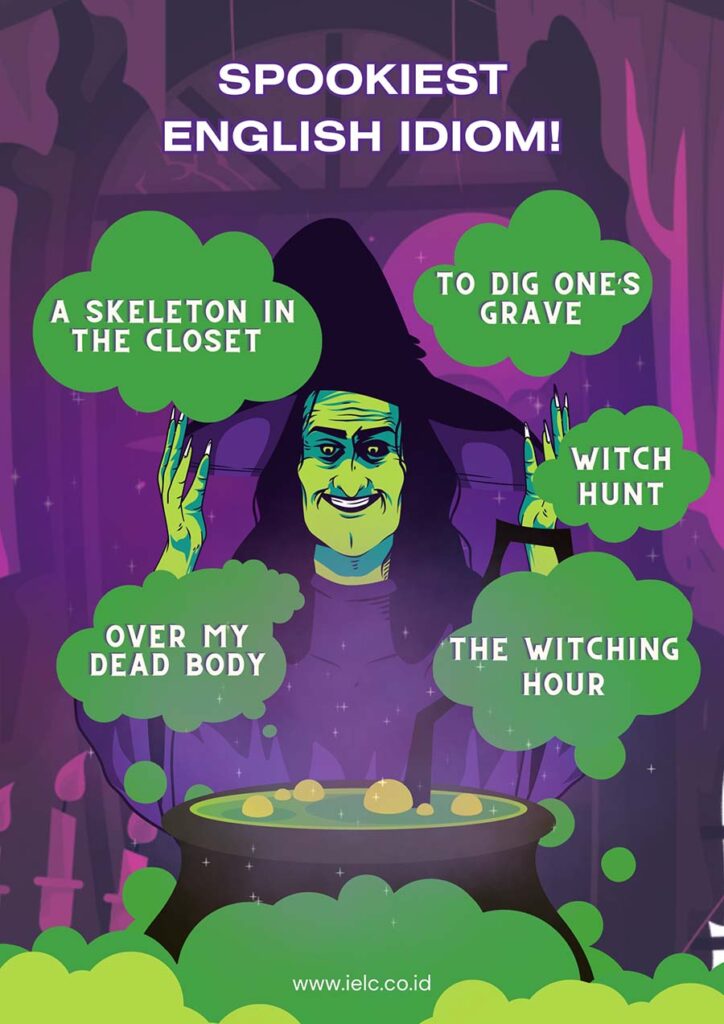
Hauntingly expressive: 10 spookiest English idioms explained
Welcome, learners!
Halloween is just around the corner! A celebration of all things mysterious and otherworldly – pretty exciting isn’t it?
But did you know that the English language itself harbors its own collection of ghostly phrases?
Throughout the annals of time, tales of the unknown have woven themselves into our speech, giving birth to idioms that can send shivers down our spines or make our imaginations run wild…
For those brave souls seeking to unravel these enigmatic expressions, this is your bewitched guidebook. Let’s embark on a journey together, exploring the shadowy corners of the English lexicon.
Ready to be spooked?

1. Over my dead body
Meaning: The phrase “over my dead body” is a dramatic way of saying “I will never allow that to happen.” When someone uses this expression, they are emphasizing their strong opposition to a particular action or decision, suggesting they would go to great lengths to prevent it.
Origin: While the exact origins of this idiom are a bit murky, its vivid imagery is clear: it evokes the idea that the only way a particular event would come to pass is if the person saying it were dead and thus, unable to prevent it.
Such strong sentiments can be traced back through literature and historical accounts, highlighting the depth of human emotions and determination. It’s a testament to the lengths people would go to stand by their beliefs or protect their loved ones!
Example:
Alice: “I think I am going to sell our family’s home.”
Arthur: “Over my dead body! This house has been with our family for generations!”
2. The witching hour
Meaning: “The witching hour” refers to a specific time of night when supernatural events are believed to be at their peak, and it’s most commonly understood as midnight. It can also suggest a time when a person, especially a child, is inexplicably restless or irritable.
Origin: The term “witching hour” has its roots in folklore and old beliefs about witchcraft. Historically, it was believed that witches and other supernatural entities were most active and powerful during this hour. Midnight, the transitional moment between days, has often been viewed with a mix of reverence and apprehension, a time when the veil between the physical and supernatural worlds is at its thinnest.
Example:
Every night, like clockwork, her baby becomes fussy around midnight. She jokingly calls it his “witching hour.”
3. A skeleton in the closet
Meaning: Having “a skeleton in the closet” means possessing a shameful secret or a hidden past that one wants to keep concealed. The ‘skeleton’ represents something scandalous or unpleasant, and the ‘closet’ symbolizes the private, hidden spaces of our lives where such secrets are kept.
Origin: The phrase is believed to have originated in the 19th century. Its imagery draws on the idea that one is hiding something as significant and shocking as a human skeleton. This notion ties into older, Gothic literature traditions where skeletons or bodies were literally hidden or bricked up in buildings, symbolizing the lurking presence of the past…
Example:
The politician seemed genuine, but when journalists dug deeper, they discovered he had a few skeletons in his closet.
4. To dig one’s grave
Meaning: When someone is said to “dig their own grave,” it means they are creating a situation that will bring about their own downfall or ruin. It suggests that the person’s actions, decisions, or words are setting them up for significant negative consequences.
Origin: The phrase draws from the literal act of digging a grave, which signifies death. In this idiom, however, the ‘death’ is metaphorical, representing self-inflicted harm or demise. It paints a vivid picture of a person actively working on their own undoing, much like how one might dig a hole for themselves.
Example:
By constantly undermining his colleagues, Jack is just digging his own grave at the company.
5. Witch hunt
Meaning: A “witch hunt” refers to a campaign directed against a person or group holding unorthodox or unpopular views, often based on unfounded suspicions or false accusations. It emphasizes a fervent, and often irrational, pursuit of someone perceived as a threat, even in the absence of solid evidence.
Origin: The term has its dark roots in the historical events where alleged witches were hunted, accused, and often executed based on flimsy evidence, mass hysteria, or personal vendettas. Most famously, the Salem witch trials in 1692 Massachusetts saw numerous innocent people accused of witchcraft, leading to tragic outcomes.
Example:
The media’s relentless investigation into the celebrity’s personal life felt like a witch hunt.
6. Ghost town
Meaning: A “ghost town” refers to a once-thriving town or city that has been abandoned and is now largely uninhabited, often due to economic decline, natural disasters, or other calamities. The term evokes an eerie emptiness, where the only “residents” left are the memories (and perhaps the spirits) of the past.
Origin: The phrase is believed to have its origins in the American Old West, where towns would spring up rapidly during gold or silver rushes. However, once the resources ran out or were no longer profitable, these towns would be abandoned almost overnight, leaving behind empty buildings and desolate streets.
Example
After the mine closed, what was once a bustling community quickly turned into a ghost town.
7. Devil’s advocate
Meaning: To play “devil’s advocate” means to adopt a position one does not necessarily agree with, solely for the sake of debate or to challenge a perspective. The individual deliberately presents opposing arguments to provoke discussion, test the validity of the original argument, or ensure that all sides of an issue are considered.
Origin: The term has religious roots, originating from the Roman Catholic Church. When considering someone for sainthood, the Church would appoint an official, the “Promoter of the Faith” or “devil’s advocate,” whose role was to critically argue against the candidate’s canonization by pointing out flaws or presenting contrary evidence.
Example: While I believe in the new policy’s benefits, I’ll play devil’s advocate to ensure we’ve examined all potential drawbacks.
8. Skeleton crew
Meaning: A “skeleton crew” refers to the smallest number of people needed for a business or organization to function. This typically happens during off-hours, holidays, or extenuating circumstances when only essential operations are maintained, and the majority of the staff is absent.
Origin: The origin of this idiom is not entirely clear, but it’s thought to come from nautical terminology. Ships sometimes had to be operated with a reduced number of crew members perhaps due to illness, desertions, or other reasons. The term “skeleton” is used metaphorically to imply the bare minimum or basic structure, just as skeleton is the basic structure of a body.
Example:
Over the holiday period, the factory will be running with a skeleton crew to handle any emergencies.
9. Make someone’s blood runs cold
Meaning: To “make someone’s blood run cold” means to horrify, scare, or deeply unsettle them. When confronted with something terrifying or shocking, a person might feel a sudden coldness or numbness, as if their blood itself has turned icy.
Origin: The idiom draws from the body’s physical reactions to fear. When faced with a threat, humans often experience a rush of adrenaline, which can result in various sensations, including coldness, shivers, or goosebumps. This physiological response paired with the symbolic association of coldness with fear and death has given rise to the evocative phrase.
Example:
Reading about the gruesome details of the crime made my blood run cold.
10. Make someone’s blood boils
Meaning: To “make someone’s blood boil” means to incite intense anger or strong resentment in someone. When something is so infuriating that it feels as though one’s very blood is heating up in their veins, this expression captures that powerful emotion in vivid, visceral terms.
Origin: This evocative idiom draws from the human body’s physiological responses to anger. Just as our face might turn red and our heart rate increase when we’re angry, the notion of boiling blood extends this imagery to illustrate a deep-seated, burning rage. The extreme heat of boiling provides a striking contrast to the coldness often associated with fear, highlighting the different yet equally intense nature of these emotions.
Example:
The way he dismissively spoke to her was enough to make her blood boil.
Summary
This Halloween, while the world celebrates the supernatural, remember that sometimes, the most haunting tales can be spun from the words we use every day. Let these spooky idioms add a touch of the macabre to your stories, and may they resonate with listeners long after the candle’s flame has gone out. Here’s to the magic of language and the shadows it can cast. Happy Halloween! 🎃👻🌙
At IELC, we teach English the right way
Our goal is to get you speaking in English with fluency and confidence as fast as possible. We want to give you the skills you need to fulfil your potential!
Our experienced teachers will guide you along every step of the learning process to ensure that you are not wasting your time, money, and energy on useless language exercises & wrong methods.
Our courses
With our modern campus and technology, we are equipped to provide the best possible courses for children, teens, and adults, including:
Online and on campus IELTS courses
Online and on campus TOEFL PBT courses
Online and on campus TOEFL iBT courses
We offer our classes in group classes or private classes.
No matter what your goals are, our team will help you achieve these goals by providing you with Indonesia’s best English courses!
Talk to our team today to get your FREE consultation and take your first step towards success.
Sincerely,

IELC Academic Director
